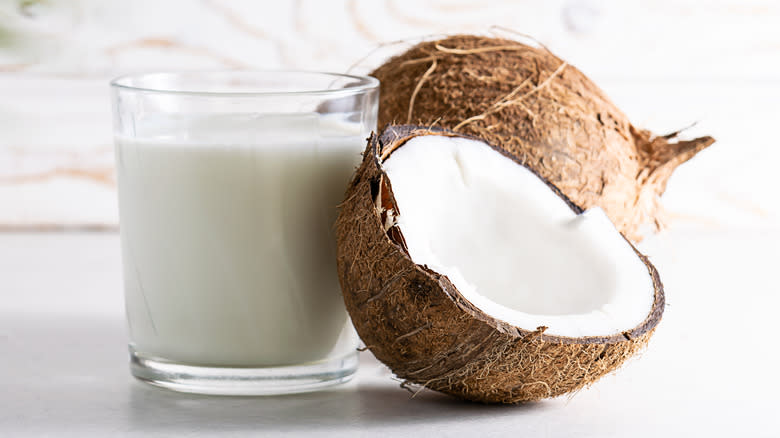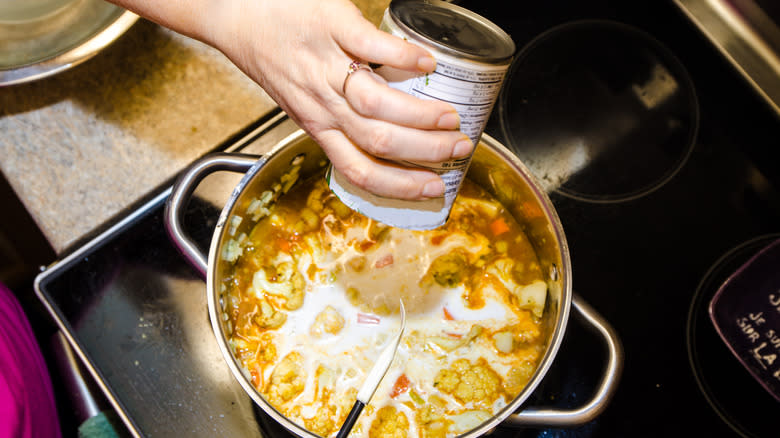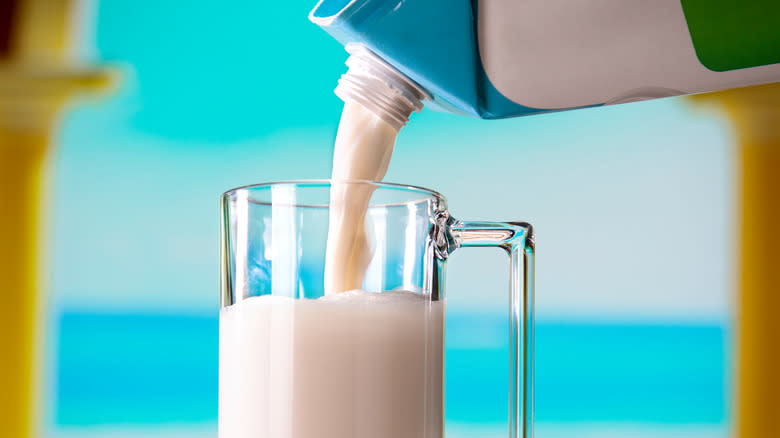The Difference Between Canned And Cartoned Coconut Milk

As more people become acquainted with the health and environmental benefits of adhering to a plant-based diet, products like coconut milk have become an increasingly popular choice for cooking and coffee-making. With more millennials working towards a plant-based lifestyle, a 2020 report by Grand View Research, Inc. suggested that of all the milk alternatives, coconut milk was positioned to have the highest growth rate between 2023 and 2030.
Commonly used in cuisines throughout the Caribbean, Latin America, Africa, southern Asia, and southeastern Asia, coconut milk is regarded as a nutritional powerhouse of sorts, mostly due to its high quantity of medium-chain saturated fatty acids (MCFAs). Easily digested and converted into energy, researchers say MCFAs found in coconut milk increase heart health, reduce inflammation and the build-up of fatty tissue, and fight infection. With a slightly sweet and fruity flavor, coconut milk also brings a touch of tropical flair to any recipe it touches.
Made from pulverized coconut flesh and water, coconut milk is generally found in two varieties, which are notably different in regard to taste, fat content, and how they should be used. So before you run out and stock up, allow us to explain the difference between the cartoned coconut milk used to make your morning latte and the canned version you incorporate into your favorite Panang curry recipe.
Read more: Bottled Water Brands, Ranked Worst To Best
Canned Coconut Milk

Often found in the international foods aisle of the grocery store, canned coconut milk is typically used for cooking. Containing 48 grams of fat per serving, it works to supply vegan dishes with a thickness and creaminess not easily achieved without traditional dairy products. The additional fat also lends to a more pronounced coconut flavor than its cartoned counterpart. This makes canned coconut milk a lovely addition to soups, curries, dips, ice cream, and vegan baked goods.
Unlike cartoned coconut milk, the canned variety is made with nothing more than blended coconut meat, water, and in some instances, guar gum, which works to prevent separation. Without a stabilizer, canned coconut milk tends to separate into two identifiable layers when stored at or above room temperature. The solid, oily layer on top is called coconut cream. Made of more fat and less water, coconut cream is undeniably thick and rich in flavor. As such, vegans and people with a dairy intolerance often use coconut cream as a non-dairy substitute for heavy cream. Beneath the layer of coconut cream in a can of coconut milk is a thin white liquid that, when gently heated, reintegrates with the cream, forming a thick, velvety liquid. Unopened, canned coconut milk has a shelf life of two to five years. Once opened, however, it can remain fresh in the fridge for up to 10 days.
Cartoned Coconut Milk

Commonly used as a substitute for regular milk, cartoned coconut milk is a popular choice for latte lovers, cereal connoisseurs, and smoothie enthusiasts. Possessing a much thinner and smoother consistency, cartoned coconut milk is made in the same way as the canned stuff, but with the subsequent addition of more water. To make up for the high water content, cartoned coconut milk alternatives are often fortified with vitamins and minerals, and have added sugars, preservatives and stabilizers, as well as flavoring and thickening agents to improve taste and texture.
Pacific Foods' Barista Series coconut milk contains just five grams of fat per serving, according to the company's website. With almost 10 times less fat than some canned varieties, the flavor of cartoned coconut milk often pales in comparison. While that may be a downside for some folks, for others it lends to the product's drinkability. That minimal amount of fat also makes cartoned coconut milk less than ideal for cooking, but it can appeal to those seeking a lower-calorie non-dairy option. In addition, the lower fat content (as well as the inclusion of stabilizing gums) ensures that cartoned coconut milk won't separate in storage. While its shelf life is not quite as long as canned coconut milk, it can remain viable unopened at room temperature for six to 12 months. After opening it should be kept in the fridge and discarded after seven to 10 days.
Read the original article on Mashed.

